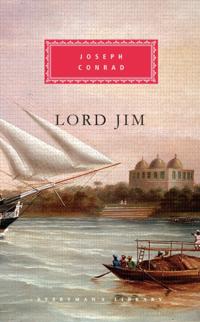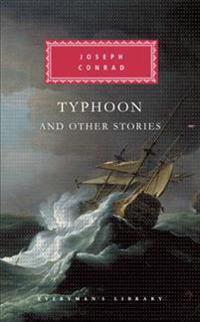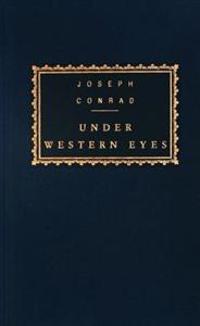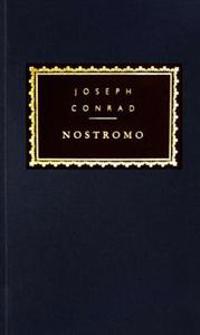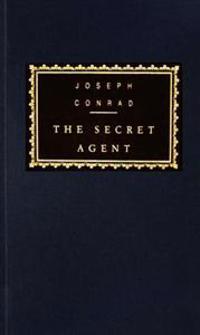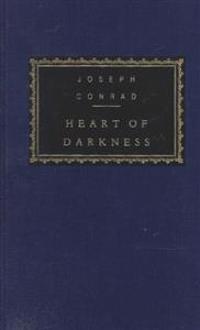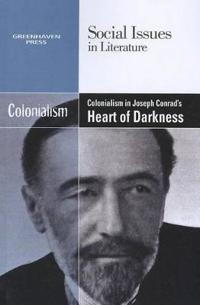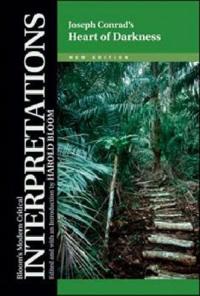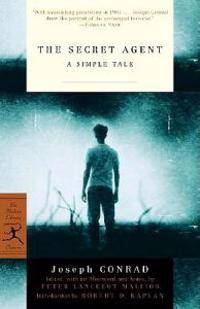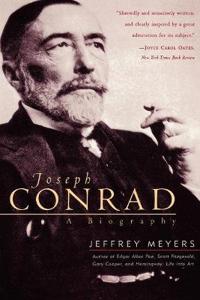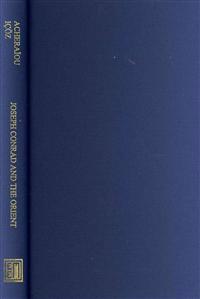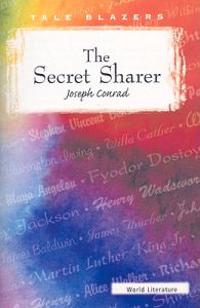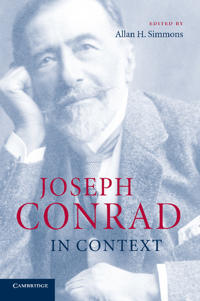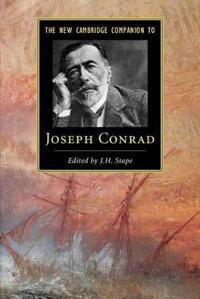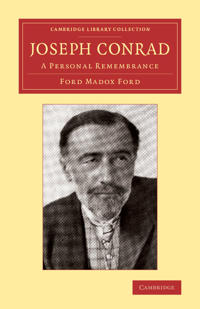Fictions Of Empire (Pocket)
avRobert Stevenson, Alan Richardson, Rudyard Kipling, John Kucich, Joseph Conrad
ISBN: 9780618084883 - UTGIVEN: 2002-04-26Lord Jim (Inbunden)
avJoseph Conrad, Norman Sherry
ISBN: 9780679405443 - UTGIVEN: 1992-03A young Englishman branded as a coward seeks personal redemption for an act of selfishness
Typhoon and Other Stories (Inbunden)
avJoseph Conrad, Hinrichs, Martin Seymour-Smith
ISBN: 9780679405474 - UTGIVEN: 199110Joseph Conrad's long experience as a working seaman enriched and deepened his literary gifts, making him the most brilliant and convincing writer of seafaring's greatest age. In the three sea stories collected here, he makes deft use of the maritime setting to enact moral dramas of men tested by the[...]
Under Western Eyes (Inbunden)
avJoseph Conrad
ISBN: 9780679405542 - UTGIVEN: 1991-11Describes a band of frustrated revolutionary exiles in Geneva. This book is a study of individuals under pressure, and it remains a telling account of the fugitive life - especially in its portrait of Razumov, heir to the long line of Russian anti-heroes in Gogol, Dostoyevsky and Turgenev.
In th[...]Nostromo (Inbunden)
avJoseph Conrad, Tony Tanner
ISBN: 9780679409908 - UTGIVEN: 199206A novel, in which Charles Gould returns to South America determined to make a success of the inheritance left to him by his father, the San Tome mine. But his dreams are thwarted as the country is plunged into revolution.
Conrad's foresight and his ability to pluck the human adventure from compl[...]The Secret Agent (Inbunden)
avJoseph Conrad
ISBN: 9780679417231 - UTGIVEN: 199212This is the only novel that Conrad set in London, and it communicates a profoundly ironic view of human affairs. The story is woven around an attack on the Greenwich Observatory in 1894. Verloc, (a Russian spy who is also working for the police) is ostensibly a member of an anarchist group in Soho. [...]
Heart of Darkness (Inbunden)
avJoseph Conrad, Verlyn Klinkenborg, Catherine Coulter
ISBN: 9780679428015 - UTGIVEN: 199310In a novella which remains highly controversial to this day, Conrad explores the relations between Africa and Europe. On the surface, this is a horrifying tale of colonial exploitation. The narrator, Marlowe journeys on business deep into the heart of Africa. But there he encounters Kurtz, an ideali[...]
Colonialism in Joseph Conrad's Heart of Darkness (Pocket)
avClaudia Durst (EDT) Johnson
ISBN: 9780737758047 - UTGIVEN: 2012-04Joseph Conrad's Heart of Darkness & the Secret Sharer (häftad)
ISBN: 9780764191107 - UTGIVEN: 1984-12Joseph Conrad's Heart of Darkness
ISBN: 9780791098257 - UTGIVEN: 2008-02Joseph Conrad's ""Heart of Darkness"" is not simply a critique of colonialism in the Congo; it is an examination of the human tendency toward self-endangering corruptibility. This collection of critical essays suggests it has taken on the power of myth.[...]
The Secret Agent (Häftad)
avJoseph Conrad
ISBN: 9780812973051 - UTGIVEN: 2005-01Edited and with Notes by Peter Lancelot Mallios
Introduction by Robert D. Kaplan
In reexamining "The Secret Agent in a post-9/11 world, Robert D. Kaplan praises Joseph Conrad's "surgical insight into the mechanics of terrorism," calling the book "a fine example of how a savvy novelist may det[...]Joseph Conrad (Häftad)
avJeffrey Meyers
ISBN: 9780815411123 - UTGIVEN: 200102In Joseph Conrad: A Biography, acclaimed writer Jeffrey Meyers presents the definitive account of the life of Joseph Conrad (1857-1924), author of Heart of Darkness, Lord Jim, Nostromo, and many other landmarks in modern literature. Meyers' biography, published for the first time in paperback by Coo[...]
Joseph Conrad: Between Literary Techniques and Their Messages (Övrig)
avWieslaw Krajka
ISBN: 9780880336512 - UTGIVEN: 2010-04-13Thirteen contributors from a variety of backgrounds tackle the use of irony, contrast, narrative, themes of belonging, Englishness, imperialism, portrayals of women, and conceptions of truth and evil as they were expressed in the work of Joseph Conrad. Wieslaw Krajka expands Conrad criticism to exp[...]
In the Realms of Biography, Literature, Politics, and Reception: Polish and East-Central European Joseph Conrad (Övrig)
avWieslaw Krajka
ISBN: 9780880336819 - UTGIVEN: 2011-02-11The literary studies comprised in nineteenth volume of the "Conrad: Eastern and Western Perspectives" series, compare fact v. fiction/non-fiction, ideas, literary works, translations, literature and film. The works by Joseph Conrad analyzed in this volume comprise Almayer's Folly, "Heart of Darkness[...]
Joseph Conrad and the Orient (Inbunden)
ISBN: 9780880336949 - UTGIVEN: 2012-05Joseph Conrad and the Orient is the first major study that deeply explores Conrad's perception and construction of the Orient in his Malay fiction. While it entertains a sustained dialogue with past and recent studies of Conrad's handling of colonial cross-cultural encounters, imperial ideology and [...]
Heart of Darkness (e-bok)
avJoseph Conrad
ISBN: 9781105512643Heart of Darkness is a novella written by Joseph Conrad. It was classified by the Modern Library website editors as one of the "e;100 best novels"e; and part of the Western canon. The story centers on Charles Marlow, who narrates most of the book. He is an Englishman who takes a foreign as[...]
The Shadow-line (Inbunden)
avJoseph Conrad
ISBN: 9781107024427 - UTGIVEN: 2013-08-31The most authoritative critical edition to date of Conrad's only major novel from 1914 to 1918, The Shadow-Line, A Confession.[...]
Joseph Conrad's Critical Reception (Inbunden)
avJohn G. Peters
ISBN: 9781107034853 - UTGIVEN: 2013-04-29This book provides a comprehensive, up-to-date history of the commentary written about the life and works of Joseph Conrad.[...]
Joseph Conrad in Context
ISBN: 9781107429567 - UTGIVEN: 2014-07Joseph Conrad's Polish background, his extensive travels and his detached view of his adopted country, Britain, gave him a perspective unique among English writers of the twentieth century. Combining Continental and British influences, Victorian and Modernist styles, he was an artist acutely respons[...]
The New Cambridge Companion to Joseph Conrad
ISBN: 9781107610378 - UTGIVEN: 2014-09Joseph Conrad's centrality to modern literature is well established. The New Cambridge Companion to Joseph Conrad provides essential guidance to varied developments in the field of Conrad studies since the publication of The Cambridge Companion to Joseph Conrad (1996). The volume's thirteen chapters[...]
The Secret Agent (Pocket)
avJoseph Conrad
ISBN: 9781108057134 - UTGIVEN: 2013-01-03Originally published in 1907, this classic novel is an exploration of terrorism and anarchism in late nineteenth-century London.[...]
The Secret Agent: A Simple Tale (Inbunden)
avJoseph Conrad
ISBN: 9781108060394 - UTGIVEN: 2013-05-09Originally published in 1907, this classic novel is an exploration of terrorism and anarchism in late nineteenth-century London.[...]
Joseph Conrad (Pocket)
avFord Madox Ford
ISBN: 9781108060943 - UTGIVEN: 2013-06Determined not to write a biography about his friend Joseph Conrad (1857-1924) in the usual dry style, Ford Madox Ford (1873-1939) instead produced a novel. Like his fictional narrators, he has an imperfect memory: he places the beginning of their acquaintance several years after they first collabor[...]


